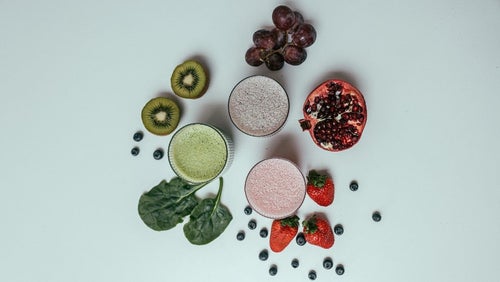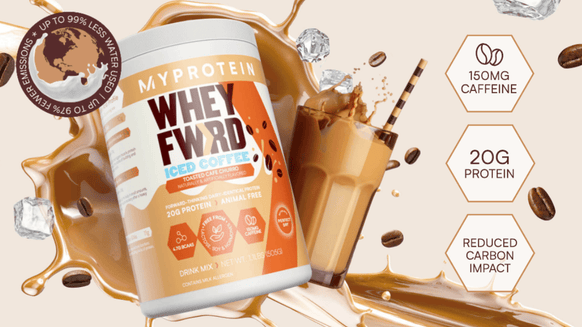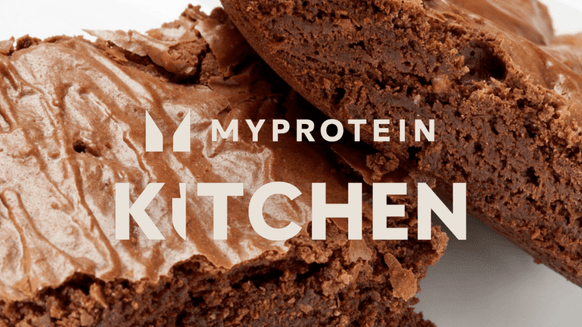Protein Shake With Milk Or Water | What’s The Difference?

So, you’ve got your protein, know all the benefits of how it allows you to quickly absorb and digest all the protein that you need immediately before, during and after a workout, and you’re starting to see and feel the difference. The label directs you to mix it with water or milk. So, should you have your protein shake with milk or water – surely the results aren’t different, are they?
- Should you have a protein shake with milk or water?
- Benefits of protein shakes with milk
- Negatives of protein shakes with milk
- Benefits of protein shakes with water
- FAQs
Should You Have a Protein Shake with Milk or Water?
We’re going to try and avoid sitting on the fence here, so excuse us when we begin by saying it depends. There isn’t just one benefit to each way – there are several, but it really does depend on what your aims are.
When building mass and muscle, mixing your protein with milk will yield better results. For lean builders, trimmers and toners, water is the way to go. It comes down to nutrition, as that’s exactly why you are drinking protein shakes in the first place.
Benefits of Protein Shakes with Milk
Protein in Milk
For muscle gain, there are some serious advantages to be had from consuming your protein shake with milk. Casein and whey are the two high-quality proteins found in milk, at a ratio of approximately 80% casein to 20% whey.
Don’t get us wrong – you of course get a helping of protein in your water-mixed protein shake, but adding it to milk will give you the edge by providing you with more protein. How much? Every cup of milk you add to your protein has 8 grams of protein already in it.
Milk can directly help your muscles to recover and rebuild after a rigorous strength workout. Building lean muscle mass actually comes with many more benefits than looking muscular alone. It can help to manage body fat and calorie balance, as well as lowering risk of diseases and common illnesses.
Milk is the obvious choice for anyone trying to build – especially hard gainers struggling to garner enough mass to change their body type. Milk is a good source of fats and carbohydrates to achieve this. Carbohydrates not only help you to build size and aid muscle recovery after a heavy lifting session, but they provide you with the energy to get the job done in the gym.
If you’re a vegan looking to build muscle mass, soya milk is your best best for getting an additional hit of protein with 8g of protein per cup.
Taste
Nutrition aside, many people recommend milk as a mixer from the taste alone, as it gives a creamier mouthfeel and slightly sweeter taste, satisfying sweet-tooth cravings and leaving you feeling fuller.
Negatives of Protein Shakes with Milk

Benefits of Protein Shakes with Water
They’re better for cutting
Water is calorie-free. The major benefit of taking your protein with water instead of milk comes down to weight management.
Mass gainers will benefit from milk, but if you’re trying to manage your weight while getting your protein, water is on your side. One scoop of the average protein powder mixed with just one cup of milk is an estimated 270 calories. A protein shake mixed with water is usually a mere 110 calories.
The same goes for carbohydrates and fats. Let’s make it clear that you need carbs and fats for not only muscle gain, but for general health. For macronutrient counters, carbohydrates and fats are an area to which you will be paying particularly close attention.
Milk contains carbohydrates. While above we mentioned the advantages of the carbohydrates in milk (that everyone should keep in mind), carbs may be something you’re cutting elsewhere and don’t want in abundance in your post-workout shake.
Milk is a source of fat. While your body needs fat, if your protein shake is all about the protein for you, then water is the way to go. To give you a better idea of exactly what you’re consuming, each 250ml glass of whole milk provides 8.3 grams of fat and 4.8 grams of saturated fat.
A good protein powder is designed to taste great with either milk or water, so you needn’t worry about losing flavour with your water-based shake.
Our Clear Whey and Clear Vegan however, are both designed to go with water to make you the summer post-workout drink of your dreams. And we
They can be more easily digested
Using water instead of milk in your protein shakes can cause less stomach discomfort and bloating if you are lactose-sensitive. You may feel lighter and leaner if you use water than mixing with milk.
Take Home Message
So, should you have your protein shake with milk or water? Taste aside, there are some serious differences between taking your protein with milk and water. Water is ideal if weight-loss is your goal, providing protein while minimising the fats and carbohydrates found in milk. Those fats and carbohydrates are nothing to be ignored for muscle builders and gainers, who will massively benefit from the extra protein found in milk.
FAQs
Should I take my protein shake with milk or water?
If your goal is to build mass, mixing protein powder with milk may be more beneficial. If your goal is to lose weight, mix with water.
What are the benefits of taking protein shakes with milk?
Mixing protein powder with milk provides you with more protein than mixing with water. Milk also contains fats and carbohydrates, essential for muscle recovery.
What are the benefits of taking protein shakes with water?

Benefits Of Protein Shakes Before Bed
It's time to switch up your midnight snack.

Claire is a Registered Dietitian through the Academy of Nutrition and Dietetics and a board-certified Health and Wellness Coach through the International Consortium for Health and Wellness Coaching. She has a Bachelor of Science in Biology and a Master’s degree in Clinical Dietetics and Nutrition from the University of Pittsburgh.
Talking and writing about food and fitness is at the heart of Claire’s ethos as she loves to use her experience to help others meet their health and wellness goals.
Claire is also a certified indoor cycling instructor and loves the mental and physical boost she gets from regular runs and yoga classes. When she’s not keeping fit herself, she’s cheering on her hometown’s sports teams in Pittsburgh, or cooking for her family in the kitchen.
Find out more about Claire’s experience here.
- Luhovyy, B. L., Akhavan, T., & Anderson, G. H. (2007). Whey proteins in the regulation of food intake and satiety. Journal of the American College of Nutrition, 26(6), 704S-712S.
- Guzmán‐González, M., Morais, F., Ramos, M., & Amigo, L. (1999). Influence of skimmed milk concentrate replacement by dry dairy products in a low fat set‐type yoghurt model system. I: Use of whey protein concentrates, milk protein concentrates and skimmed milk powder. Journal of the Science of Food and Agriculture, 79(8), 1117-1122.
- Frestedt, J. L., Zenk, J. L., Kuskowski, M. A., Ward, L. S., & Bastian, E. D. (2008). A whey-protein supplement increases fat loss and spares lean muscle in obese subjects: a randomized human clinical study. Nutrition & metabolism, 5(1), 1-7.








